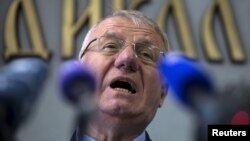Serbia must cooperate with a U.N. war crimes court seeking the return of an ultra-nationalist defendant, not on the basis of truth or justice but because it's the law, the Balkan country's president said on Friday.
The remarks by President Tomislav Nikolic underscored the disdain many Serbs feel for the Hague-based tribunal, which released firebrand politician Vojislav Seselj in November on grounds of ill-health only to demand his return this week.
Nikolic was Seselj's right-hand man during the war years of Yugoslavia's collapse in the 1990s, when both men were disciples of a 'Greater Serbia' ideology.
But both Nikolic and Prime Minister Aleksandar Vucic - another former Seselj ally - turned their backs on him in 2008 when they pushed instead for Serbia's Western integration.
Seselj's return to Serbia, and his subsequent refusal to heed the tribunal's call for him to come back, has put them in an awkward spot, confronting them with the unpalatable prospect of having to extradite a man who was once their close friend.
"It's always tough when you have to cooperate exclusively because of the law, and not because of justice, God or the truth," Nikolic told local TV Chuprija late on Thursday, in comments carried by the state news agency Tanjug on Friday.
The president also warned the media to keep its distance, echoing an often hostile tone used by officials in Serbia's conservative government towards its press critics.
"The media shouldn't be meddling in this, because they'll only make things worse. I know who's on which side. And I can tell you honestly, none of them is on the side of Seselj. They want to use any opportunity to bring down the government," he said.
Serbian cooperation with the U.N. tribunal for the former Yugoslavia has long been a key condition of the country's closer integration with the European Union.
The government is likely to face increasing Western pressure to arrest Seselj if he does not agree to return voluntarily.
Serbia wants the EU to open the first so-called 'chapters' of accession talks this year.
Seselj, who has cancer, has said police will have to carry him to the plane, though Vucic has appeared to rule out using force, saying Seselj would not be arrested in a "raid."
Seselj handed himself into the tribunal in 2003, but was released in November on compassionate grounds before any verdict was reached in his long-running trial. This order was revoked on Monday because he had publicly said he would not return to the court once a verdict was reached.





